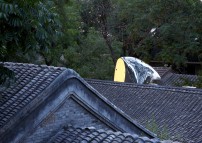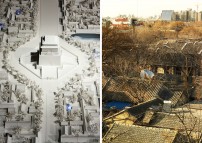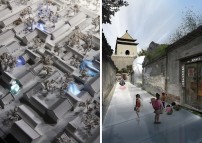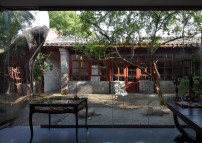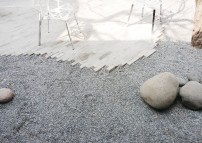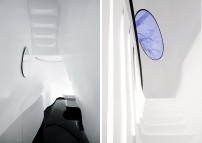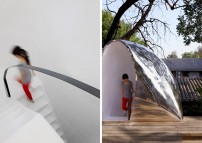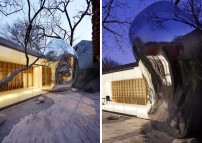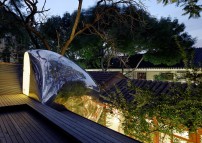MAD’s proposal for a future Beijing was first revealed at its exhibition MAD IN CHINA, shown during the 2006 Venice Architecture Biennale. Beijing 2050 imagined three scenarios for the future of Beijing―a green Public Park in Tiananmen Square, a series of floating islands above the city’s CBD, and the “Future of hutongs,” which featured metallic bubbles scattered throughout Beijing’s oldest neighborhoods. Three years later, the first hutong bubble appears in a small courtyard in Beijing.
China’s rapid development has altered the city’s landscape on a massive scale, continually eroding the delicate urban tissue of old Beijing, particularly the traditional alleyway neighborhoods known as hutongs. Such dramatic changes have forced an aging architecture to rely on the right opportunity, spontaneous renovations to keep pace with the ever-changing neighborhood. In addition, poor standards of hygiene have turned unique living spaces and potentially thriving communities into derelict districts. Hutongs are increasingly disregarded by their own residents, and turned into quaint theme parks for tourists.
The self-perpetuating degradation of the city’s urban tissue requires a change in the living conditions of local residents. Progress does not necessarily call for large scale construction – it can occur as interventions at a small scale. The hutong bubbles it is plugged into the urban tissue, it is an attractor, attracting new people, activities, and resources to bring together a neighborhood. They exist in symbiosis with the old. It is fueled by urban residue, the bubbles and it transforms to support the community’s needs. It allows the local residents to continue living in the old neighborhoods. In time, these interventions will become part of Beijing’s extending history, newly formed membranes within the city’s urban tissue.
Hutong Bubble 32 provides a toilet and a staircase that extends onto a roof terrace for a newly renovated courtyard house. Its shiny exterior renders it an alien creature, and yet at the same time, it morphs into the surrounding wood, brick, and greenery. The past and the future can thus coexist in a finite, yet dream-like world.
The real ambition is for the hutong bubble to connect to the culturally rich urban environment, to connect to each individual’s vision of a better Beijing. The bubble is not a singular object, but an architecture that will initiate a renewed and energetic community. Under the current fast-paced development, we must remember of Beijing’s long term goals and the direction of its creativity. Perhaps we should shift our sights away from the glory attraction of the new iconic, instead see how the mass citizen of the city’s illuminate through this new network.
| Location : Beijing, China |
| Type : Courtyard Renovation |
| Time : 2008-2009 |
| Site Area : 140sqm |
| Building Area : Bubble 10sqm |
| Directors : Ma Yansong, Dang Qun |
| Design Team : Dai Pu, Yu Kui, Stefanie Helga Paul, He Wei, Shen Jianghai |
| Construction Engineer : Beijing Nade Environmental Art Design Co., Ltd. |
